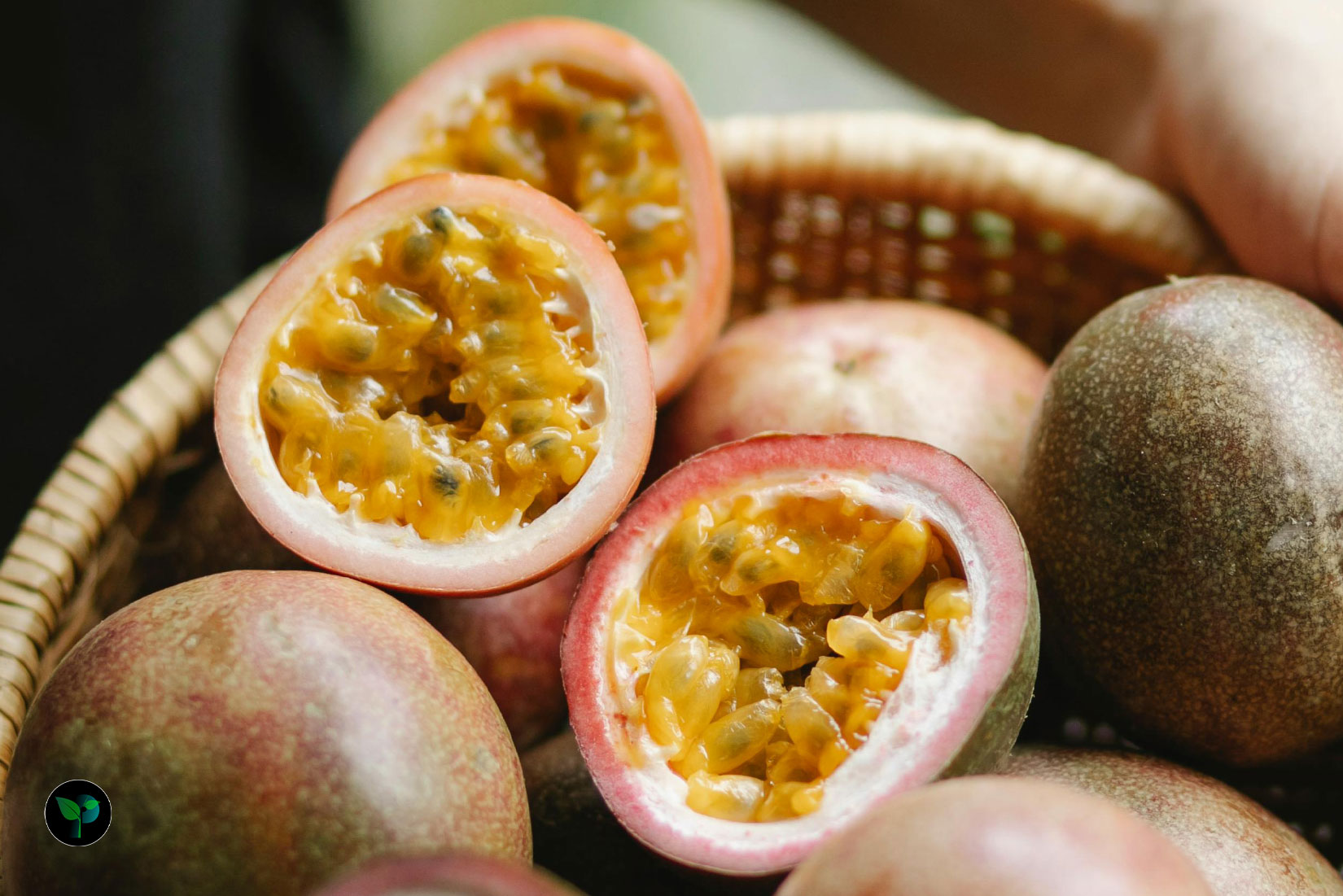Step into the vibrant world of Plants Folder, where nature’s wonders come alive in every leaf and fruit. In this latest exploration, we venture into the lush realm of passion fruit—a tropical gem renowned for its tantalizing flavor, exquisite aroma, and treasure trove of health benefits. Join us on a journey through the sun-kissed orchards where passion fruit vines entwine, bearing the promise of a sweet and tangy delight. Discover the allure of this exotic fruit, as we delve into its rich history, versatile culinary uses, and potential to nourish both body and soul.
Passion fruit is a tropical fruit that comes from the Passiflora genus of flowering plants. It is known for its sweet and tangy flavor and is popular in various culinary uses, including juices, and desserts, and as a flavorful addition to dishes. The passion fruit plant typically produces round or oval-shaped fruit with a tough outer rind that can range from purple to yellow when ripe.

Key points about passion fruit
Flavor: The fruit’s pulp is aromatic, with a sweet-tart taste that makes it a favorite for both sweet and savory dishes.
Varieties: There are different varieties of passion fruit, with the most common being the purple passion fruit (Passiflora edulis) and the yellow passion fruit (Passiflora edulis f. flavicarpa).
Nutritional Benefits: Passion fruit is rich in vitamins, minerals, fiber, and antioxidants, making it a nutritious addition to a balanced diet.
Culinary Uses: It is used in a variety of dishes, including desserts like mousses, tarts, and ice creams, as well as in cocktails, smoothies, and salad dressings
Health Benefits
This fruit offers a variety of health benefits due to its rich nutritional profile and unique compounds. Here are some of the potential benefits associated with consuming passion fruit:
Passion Fruit is Rich in Nutrients
it is a good source of essential nutrients like fiber, vitamin C, vitamin A, and potassium, which are important for overall health and well-being.
Antioxidant Properties
The fruit is rich in antioxidants like vitamin C, beta-carotene, and flavonoids, which help protect the body from oxidative stress and reduce the risk of chronic diseases.
Digestive Health
The fiber content in passion fruit promotes healthy digestion by aiding in bowel regularity and relieving constipation.
Immune Support
The vitamin C in this fruit boosts the immune system, helping the body defend against infections and illnesses.
Heart Health
Potassium in it may help regulate blood pressure and support heart health by reducing the risk of cardiovascular diseases.
Skin Health
Antioxidants in this fruit can help improve skin health by combating free radicals and promoting collagen production for healthy skin.
Additional Benefits
– Weight Management: The high fiber content in it can aid in weight management by promoting feelings of fullness and reducing overeating.
– Anti-Inflammatory: Some compounds in this fruit have anti-inflammatory properties, which may help reduce inflammation in the body and prevent chronic diseases.
– Eye Health: The vitamin A content in this fruit supports eye health and may reduce the risk of age-related macular degeneration.
Groups that should approach passion fruit with caution
While it is generally considered safe and nutritious for most people, some individuals may need to exercise caution or avoid consuming this fruit:
- Allergy Concerns: Individuals with allergies to this fruit or other fruits in the Passiflora genus should avoid consuming passion fruit to prevent an allergic reaction. Symptoms may include itching, hives, swelling, or difficulty breathing.
- Drug Interactions: it may interact with certain medications, especially blood thinners like warfarin. If you are taking medications, consult with your healthcare provider before consuming passion fruit to avoid potential interactions.
- Digestive Issues: Some people may experience digestive issues like bloating, gas, or diarrhea when consuming high-fiber fruits like passion fruit. If you have sensitivities to certain fibers, monitor your intake and adjust accordingly.
- Diabetes Management: it is relatively low in sugar compared to other fruits, individuals with diabetes should monitor their intake and consider how it may impact blood sugar levels.
- Pregnancy: Pregnant women should consult with their healthcare provider before adding it to their diet, as excessive consumption of certain fruits during pregnancy may not be recommended.
Key Takeaway
Individual Needs: It’s important to consider personal health conditions, allergies, and medication interactions when incorporating new foods like passion fruit into your diet. Consulting with a healthcare provider or a registered dietitian can provide personalized guidance based on your individual health needs.
Daily Consumption
The amount of passion fruit you can consume daily depends on various factors such as your overall diet, health status, and individual tolerance to fiber and sugar. Here are some general guidelines to consider when incorporating passion fruit into your daily intake:
– Moderation: As with any food, moderation is key. Consuming 1-2 passion fruits daily is considered safe for most individuals.
– Dietary Fiber: Passion fruit is high in dietary fiber, so if you are not used to consuming fiber-rich fruits, start with a smaller amount to gauge how your body reacts. Too much fiber intake suddenly can cause digestive discomfort.
– Sugar Content: While passion fruit is relatively low in sugar compared to other fruits, it’s still important to be mindful of your overall sugar intake, particularly if you have diabetes or are managing blood sugar levels.
– Varied Diet: It’s recommended to have a varied diet that includes a wide range of fruits, vegetables, whole grains, proteins, and healthy fats to ensure you receive a diverse array of nutrients.
– Consultation: If you have specific dietary concerns, or health conditions, or are following a particular diet plan, it’s best to consult with a healthcare provider or a registered dietitian to determine the ideal amount of passion fruit for your individual needs.



Leave a Reply